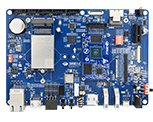飞凌嵌入式iMX8MP 开发板试用体验--编译内核源码&编译DPDK源码实现rte_ring无锁环队列进程间通信
 donatello1996
2021-11-23 14:19:00
iMX8MP
donatello1996
2021-11-23 14:19:00
iMX8MP
来源: 电子发烧友 作者:donatello1996
FETMX8MP-C核心板基于NXP i.MX 8M Plus处理器开发设计,该系列处理器专注于机器学习与视觉、高级多媒体以及具有高可靠性的工业自动化。旨在满足智慧城市、工业互联网、智能医疗、智慧交通等应用的需求。 ·强大的四核或双核Arm® Cortex®-A53处理器,主频高达1.6GHz,带有神经处理 单元(NPU),最高运行速率可达2.3 TOPS。
本文主要介绍编译内核源码&编译DPDK源码实现rte_ring无锁环队列进程间通信。
正文开始:
在虚拟机中合并压缩分卷并解压得出内核源码包文件夹OK8MP-linux-kernel,将文件夹使用tar打包并复制到TF卡文件系统中解压:
找到内核源码中的配置文件OK8MP-C_defconfig:
这个就是make选项,使用
make OK8MP-C_defconfig
指令即可配置编译选项:
make -j4
开始编译:
注意开始编译前需要安装常用软件:
apt install bison bc flex
增量编译完毕:
然后接下来就可以下载DPDK并运行rte_ring无锁环队列Demo应用,需要从
https://www.dpdk.org/
官网中下载DPDK 19.11.10 (LTS)长期支持版本:
在根目录下的mk/文件夹下找到名为rte_vars.mk设置文件,找到环境变量RTE_KERNELDIR,修改为上述的内核源码路径:
1.RTE_KERNELDIR ?= /home/OK8MP-linux-kernel/
进入usertools文件夹,找到dpdk-setup.sh脚本并运行
选择8,ARM64-armv8a-linuxapp-gcc,
这个选项会使dpdk的gcc交叉编译链生成适用于armv8a处理器的外部库,外部库中有kmod和lib等ko文件和so文件,
是用于第三方程序开发和运行的:
使用指令
insmod /home/dpdk-stable-19.11.10/arm64-armv8a-linuxapp-gcc/kmod/igb_uio.ko
加载igb_uio.ko驱动文件,这是进行dpdk开发必备的步骤:
然后是使用dpdk-devbind.py脚本手动进行hugepage大页内存绑定,此处为numa方式:
此举会将/mnt/huge文件mount成hugepage映射文件,并实实在在地占用内存空间:
准备工作完成,我们接下来可以进行rte_ring无锁环队列Demo代码的编写,但是在编写之前,需要对无锁环队列有一个基本的认识:https://blog.csdn.net/chen98765432101/article/details/69367633
无论是dpdk第三方开发的rte_ring还是Linux内核中本就存在的无锁环队列,其基本原理类似,在一条分配好的队列型内存空间中,读写方式为FIFO(先进先出),读和写的动作分别有两个进程或两个线程进行,写进程不断往地址自增的内存位置写入数据,读进程不断读取地址自增的内存位置的数据,当写位置的内存地址已为队列中内存的最高值时,需要释放队列中内存地址最低值的空间供写进程继续写,方式仍与上一周期相同(不断往地址自增的内存位置写入数据),释放过程需要保证对末尾内存地址空间的锁定与解锁,避免读写过程出错。而不同的是,Linux内核中的无锁环队列,地址管理和读写控制均由内核进行,而dpdk的rte_ring则由dpdk内部的控制器进行,因为dpdk这一模块完整地接管了所分配内存空间的管理权,是直接绕过Linux内核进行管理的,内核也无权访问dpdk控制器的具体管理细节。
编写无锁环队列两个进程的Demo,先写Primary进程:
#include <stdio.h>
#include <string.h>
#include <stdint.h>
#include <stdlib.h>
#include <inttypes.h>
#include <stdarg.h>
#include <errno.h>
#include <unistd.h>
#include <termios.h>
#include <sys/queue.h>
#include <rte_mempool.h>
#include <rte_lcore.h>
#define RTE_LOGTYPE_APP RTE_LOGTYPE_USER1
static const char *_MSG_POOL = "MSG_POOL";
static const char *_SEC_2_PRI = "SEC_2_PRI";
static const char *_PRI_2_SEC = "PRI_2_SEC";
static const char *_PRI_2_THI = "PRI_2_THI";
struct rte_ring *send_ring, *recv_ring , *send_ring_third;
struct rte_mempool *message_pool;
volatile int quit = 0;
static void * lcore_recv(void *arg)
{
unsigned lcore_id = rte_lcore_id();
printf("Starting core %u\n", lcore_id);
while (!quit){
void *msg;
if (rte_ring_dequeue(recv_ring, &msg) < 0)
{
usleep(5);
continue;
}
printf("lcore_id = %d Received '%s'\n" , lcore_id , (char *)msg);
rte_mempool_put(message_pool , msg);
}
return 0;
}
int string_size = 100;
int elt_size = 128;
pthread_t id1;
int main(int argc, char **argv)
{
const unsigned flags = 0;
const unsigned ring_size = 64;
const unsigned pool_size = 1024;
const unsigned pool_cache = 32;
const unsigned priv_data_sz = 0;
int ret;
unsigned lcore_id;
ret = rte_eal_init(argc, argv);
if (ret < 0)
rte_exit(EXIT_FAILURE, "Cannot init EAL\n");
send_ring = rte_ring_create(_PRI_2_SEC, ring_size, rte_socket_id(), flags);
recv_ring = rte_ring_create(_SEC_2_PRI, ring_size, rte_socket_id(), flags);
send_ring_third = rte_ring_create(_PRI_2_THI, ring_size, rte_socket_id(), flags);
message_pool = rte_mempool_create(_MSG_POOL, pool_size,
elt_size, pool_cache, priv_data_sz,
NULL, NULL, NULL, NULL,
rte_socket_id(), flags);
if (send_ring == NULL)
rte_exit(EXIT_FAILURE, "Problem getting sending ring\n");
if (recv_ring == NULL)
rte_exit(EXIT_FAILURE, "Problem getting receiving ring\n");
if (send_ring_third == NULL)
rte_exit(EXIT_FAILURE, "Problem getting send_ring_third\n");
if (message_pool == NULL)
rte_exit(EXIT_FAILURE, "Problem getting message pool\n");
pthread_create(&id1 , NULL , lcore_recv , NULL);
while(1)
{
void *msg = NULL;
if (rte_mempool_get(message_pool, &msg) < 0)
continue;
snprintf((char *)msg, string_size, "%s", "primary to secondary");
if (rte_ring_enqueue(send_ring , msg) < 0)
{
rte_mempool_put(message_pool, msg);
}
if (rte_mempool_get(message_pool, &msg) < 0)
continue;
snprintf((char *)msg, string_size, "%s", "primary to third");
if (rte_ring_enqueue(send_ring_third , msg) < 0)
{
rte_mempool_put(message_pool, msg);
}
sleep(1);
}
return 0;
}
注意在Makefile文件里面要关闭WERROR相关编译选项:
# BSD LICENSE
#
# Copyright(c) 2010-2014 Intel Corporation. All rights reserved.
# All rights reserved.
#
# Redistribution and use in source and binary forms, with or without
# modification, are permitted provided that the following conditions
# are met:
#
# * Redistributions of source code must retain the above copyright
# notice, this list of conditions and the following disclaimer.
# * Redistributions in binary form must reproduce the above copyright
# notice, this list of conditions and the following disclaimer in
# the documentation and/or other materials provided with the
# distribution.
# * Neither the name of Intel Corporation nor the names of its
# contributors may be used to endorse or promote products derived
# from this software without specific prior written permission.
#
# THIS SOFTWARE IS PROVIDED BY THE COPYRIGHT HOLDERS AND CONTRIBUTORS
# "AS IS" AND ANY EXPRESS OR IMPLIED WARRANTIES, INCLUDING, BUT NOT
# LIMITED TO, THE IMPLIED WARRANTIES OF MERCHANTABILITY AND FITNESS FOR
# A PARTICULAR PURPOSE ARE DISCLAIMED. IN NO EVENT SHALL THE COPYRIGHT
# OWNER OR CONTRIBUTORS BE LIABLE FOR ANY DIRECT, INDIRECT, INCIDENTAL,
# SPECIAL, EXEMPLARY, OR CONSEQUENTIAL DAMAGES (INCLUDING, BUT NOT
# LIMITED TO, PROCUREMENT OF SUBSTITUTE GOODS OR SERVICES; LOSS OF USE,
# DATA, OR PROFITS; OR BUSINESS INTERRUPTION) HOWEVER CAUSED AND ON ANY
# THEORY OF LIABILITY, WHETHER IN CONTRACT, STRICT LIABILITY, OR TORT
# (INCLUDING NEGLIGENCE OR OTHERWISE) ARISING IN ANY WAY OUT OF THE USE
# OF THIS SOFTWARE, EVEN IF ADVISED OF THE POSSIBILITY OF SUCH DAMAGE.
ifeq ($(RTE_SDK),)
$(error "Please define RTE_SDK environment variable")
endif
# Default target, can be overridden by command line or environment
RTE_TARGET ?= arm64-armv8a-linuxapp-gcc
include $(RTE_SDK)/mk/rte.vars.mk
# binary name
APP = rte_ring_primary
# all source are stored in SRCS-y
SRCS-y := main.c
CFLAGS += -O0
CFLAGS +=
include $(RTE_SDK)/mk/rte.extapp.mk
#include <stdio.h>
#include <string.h>
#include <stdint.h>
#include <stdlib.h>
#include <inttypes.h>
#include <stdarg.h>
#include <errno.h>
#include <unistd.h>
#include <termios.h>
#include <sys/queue.h>
#include <rte_mempool.h>
#include <rte_lcore.h>
#define RTE_LOGTYPE_APP RTE_LOGTYPE_USER1
static const char *_MSG_POOL = "MSG_POOL";
static const char *_SEC_2_PRI = "SEC_2_PRI";
static const char *_PRI_2_SEC = "PRI_2_SEC";
struct rte_ring *send_ring, *recv_ring;
struct rte_mempool *message_pool;
volatile int quit = 0;
int string_size = 100;
static int lcore_send(__attribute__((unused)) void *arg)
{
unsigned lcore_id = rte_lcore_id();
while(1)
{
void *msg = NULL;
if (rte_mempool_get(message_pool, &msg) < 0)
continue;
snprintf((char *)msg , string_size , "%s", "secondary to primary");
if (rte_ring_enqueue(send_ring , msg) < 0)
{
rte_mempool_put(message_pool, msg);
}
sleep(1);
}
return 0;
}
pthread_t id1;
int main(int argc, char **argv)
{
const unsigned flags = 0;
const unsigned ring_size = 64;
const unsigned pool_size = 1024;
const unsigned pool_cache = 32;
const unsigned priv_data_sz = 0;
int ret;
unsigned lcore_id;
ret = rte_eal_init(argc, argv);
if (ret < 0)
rte_exit(EXIT_FAILURE, "Cannot init EAL\n");
recv_ring = rte_ring_lookup(_PRI_2_SEC);
send_ring = rte_ring_lookup(_SEC_2_PRI);
message_pool = rte_mempool_lookup(_MSG_POOL);
if (send_ring == NULL)
rte_exit(EXIT_FAILURE, "Problem getting sending ring\n");
if (recv_ring == NULL)
rte_exit(EXIT_FAILURE, "Problem getting receiving ring\n");
if (message_pool == NULL)
rte_exit(EXIT_FAILURE, "Problem getting message pool\n");
pthread_create(&id1 , NULL , lcore_send , NULL);
while (1)
{
lcore_id = rte_lcore_id();
void * msg = NULL;
if (rte_ring_dequeue(recv_ring, &msg) < 0)
{
usleep(5);
continue;
}
printf("lcore_id = %d Received: %s\n" , lcore_id , (char *)msg);
rte_mempool_put(message_pool, msg);
}
return 0;
}
# BSD LICENSE
#
# Copyright(c) 2010-2014 Intel Corporation. All rights reserved.
# All rights reserved.
#
# Redistribution and use in source and binary forms, with or without
# modification, are permitted provided that the following conditions
# are met:
#
# * Redistributions of source code must retain the above copyright
# notice, this list of conditions and the following disclaimer.
# * Redistributions in binary form must reproduce the above copyright
# notice, this list of conditions and the following disclaimer in
# the documentation and/or other materials provided with the
# distribution.
# * Neither the name of Intel Corporation nor the names of its
# contributors may be used to endorse or promote products derived
# from this software without specific prior written permission.
#
# THIS SOFTWARE IS PROVIDED BY THE COPYRIGHT HOLDERS AND CONTRIBUTORS
# "AS IS" AND ANY EXPRESS OR IMPLIED WARRANTIES, INCLUDING, BUT NOT
# LIMITED TO, THE IMPLIED WARRANTIES OF MERCHANTABILITY AND FITNESS FOR
# A PARTICULAR PURPOSE ARE DISCLAIMED. IN NO EVENT SHALL THE COPYRIGHT
# OWNER OR CONTRIBUTORS BE LIABLE FOR ANY DIRECT, INDIRECT, INCIDENTAL,
# SPECIAL, EXEMPLARY, OR CONSEQUENTIAL DAMAGES (INCLUDING, BUT NOT
# LIMITED TO, PROCUREMENT OF SUBSTITUTE GOODS OR SERVICES; LOSS OF USE,
# DATA, OR PROFITS; OR BUSINESS INTERRUPTION) HOWEVER CAUSED AND ON ANY
# THEORY OF LIABILITY, WHETHER IN CONTRACT, STRICT LIABILITY, OR TORT
# (INCLUDING NEGLIGENCE OR OTHERWISE) ARISING IN ANY WAY OUT OF THE USE
# OF THIS SOFTWARE, EVEN IF ADVISED OF THE POSSIBILITY OF SUCH DAMAGE.
ifeq ($(RTE_SDK),)
$(error "Please define RTE_SDK environment variable")
endif
# Default target, can be overridden by command line or environment
RTE_TARGET ?= arm64-armv8a-linuxapp-gcc
include $(RTE_SDK)/mk/rte.vars.mk
# binary name
APP = rte_ring_secondary
# all source are stored in SRCS-y
SRCS-y := main.c
CFLAGS += -O3
CFLAGS += $()
include $(RTE_SDK)/mk/rte.extapp.mk
运行,这里说一下,基于rte_ring的进程间通信,Secondary进程最好是使用auto类型:
./rte_ring_primary --proc-type primary
./rte_ring_secondary --proc-type auto
运行效果:
相关产品 >
-
OKMX8MP-C开发板
内置NPU、ISP,AI计算能力高达2.3TOPS|飞凌嵌入式i.MX8MP 系列-NXP iMX8M Plus 开发板 基于高性能低功耗工业级iMX8MP核心板设计,支持多种多种高速通信接口。iMX8MP开发板内置NPU,AI计算能力2.3TOPS,支持4K,支持双图像信号处理器(ISP),是一款支持LinuxQT/android操作系统的iMX8MP开发板。
了解详情
-
FETMX8MP-C核心板
iMX8MP核心板基于 NXP i.MX 8M Plus 处理器设计, 采用4核Cortex-A53 和 Cortex-M7架构。支持双千兆网口,iMX8MP性能强劲最高运行速率可达2.3TOPS,并且i.MX8MP功耗更低≤2W 。iMX 8M Plus系列专注于机器学习和视觉、高级多媒体以及具有高可靠性的工业自动化。它旨在满足智慧家庭、楼宇、城市和工业4.0应用的需求。飞凌iMX8MP核心板提供用户手册,iMX8MP原理图,引脚定义等。
了解详情

